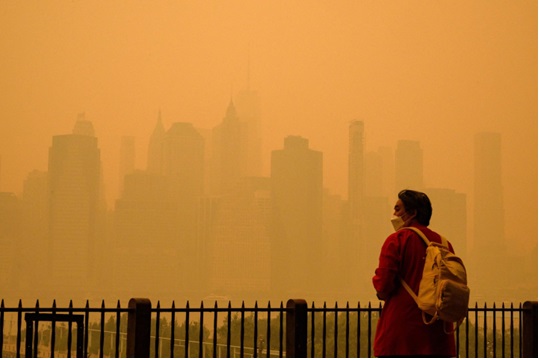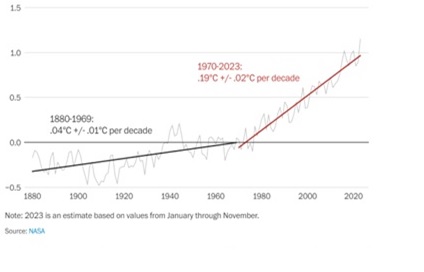
For the past several years, a small group of scientists has warned that sometime early this century, the rate of global warming — which has remained largely steady for decades — might accelerate. Temperatures could rise higher, faster. The drumbeat of weather disasters may become more insistent.
And now, after what is poised to be the hottest year in recorded history, the same experts believe that it is already happening.

In a paper published last month, climate scientist James E. Hansen and a group of colleagues argued that the pace of global warming is poised to increase by 50 percent in the coming decades, with an accompanying escalation of impacts.
According to the scientists, an increased amount of heat energy trapped within the planet’s system — known as the planet’s “energy imbalance” —will accelerate warming. “If there’s more energy coming in than going out, you get warmer, and if you double that imbalance, you’re going to get warmer faster,” Hansen said in a phone interview.
Zeke Hausfather, a climate scientist with Berkeley Earth, has similarly called the last few months of temperatures “absolutely gobsmackingly bananas” and noted, “there is increasing evidence that global warming has accelerated over the past 15 years.”
But not everyone agrees. University of Pennsylvania climate scientist Michael Mann has argued that no acceleration is visible yet: “The truth is bad enough,” he wrote in a blog post. Many other researchers also remain skeptical, saying that while such an increase may be predicted in some climate simulations, they don’t see it clearly in the data from the planet itself. At least not yet.
The Washington Post used a data set from NASA to analyze global average surface temperatures from 1880 to 2023.
The record shows that the pace of warming clearly sped up around the year 1970. Scientists have long known that this acceleration stems from a steep increase in greenhouse gas emissions, combined with efforts in many countries to reduce the amount of sun-reflecting pollution in the air. But the data is much more uncertain on whether a second acceleration is underway.
The increased rate of global warming
Values are relative to the 1951-1980 global mean temperature, in degrees Celsius

Between 1880 and 1969, the planet warmed slowly — at a rate of around 0.04 degrees Celsius (0.07 degrees Fahrenheit) per decade. But starting aroundthe early 1970s, warming accelerated — reaching 0.19 degrees C (0.34 degrees F) per decade between 1970 and 2023.
That acceleration isn’t controversial. Prior to the 1970s and 1980s, humans were burning fossil fuels — but also were releasing huge amounts of air pollution, or aerosols. Sulfate aerosols are lightly colored particles that have the ability to temporarily offset part of the warming caused by fossil fuels. They reflect sunlight back to space themselves, and also influence the formation of reflective clouds.
The more aerosols in the air, the slower the planet will heat up: a trade-off that Hansen calls a “Faustian bargain.” The idea is that because the aerosol pollutants have dangerous health effects on people, eventually societies decide to clean them up — causing dramatic warming to reveal itself in the process.
Read the full article: Is climate change speeding up? Here’s what the science says
Source: WP


